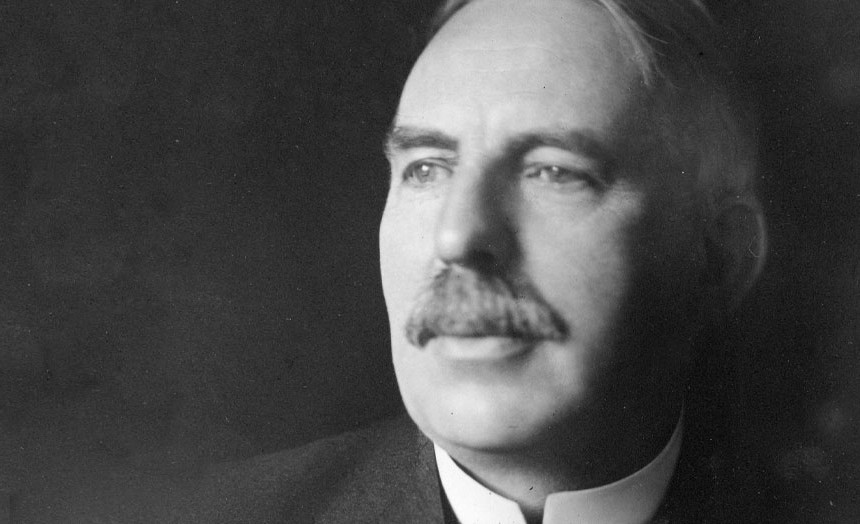
One of the most important changes arising from the 1914-18 war was that its pressure forced the foundation of ‘government science’. For the first time, official committees and research councils became part of the average scientist’s world and no man was more important in forming this partnership than Sir Ernest Rutherford and his immediate circle of friends. Their experiences during the inter-war period caused science to be more readily acknowledged as a national resource and as a result the idea of government science was spread to the USA, Canada, Australia and the main European countries.
The early months of the war seemed to have little effect on Ernest Rutherford’s work. He attended meetings of the British Association in Sydney, Australia in September 1914 and went on to visit relatives in New Zealand. When he returned to England in January 1915 he reported to his former student, Sir Ernest Marsden in New Zealand that the lights in Manchester were darkened ‘but apart from this and the occasional sight of troops marching about, it is difficult to believe that war is going on’. Back in Manchester, his concerns were only with the university and scientific matters as in a letter to his colleague, the German born physicist Arthur Schuster, he confided that although a number of his laboratory people were already in the army ‘we shall however with a little rearrangement be able to carry on the work temporarily all right’.
Throughout the war Rutherford kept in touch with his Austrian friends in the Vienna Academy and followed the fortunes of former Manchester colleague Hans Geiger, who had been wounded in the German artillery. News sometimes came directly from his former student James Chadwick who was caught in Berlin by the outbreak of the war and interned at Ruhleben civilian prison camp for four years. Whilst there, Hans Geiger helped him to set up an experimental laboratory in the stables and he was allowed to conduct scientific experiments using improvised materials such as radioactive toothpaste.
From the early stages of war, scientists had been pressing government to employ the applications of the knowledge and research in the war effort. In early 1915, the Board of Invention and Research (BIR) was an expert-level committee that was established by A J Balfour, First Lord of the Admiralty, to solicit expert scientific assistance to solve tactical and technical problems.
The BIR soon acquired a panel of scientific experts which included Rutherford and his friend William Henry Bragg. The scientists’ role was to sieve through around 100,000 ideas for war-winning devices from citizens who were convinced, as was H G Wells, that the Germans had employed science in the war effort far more successfully than Britain.
The panel set up committees and panels which they believed would be of help to the navy – submarines, aeronautics, naval construction, marine engineering, oil fuel, anti-aircraft, noxious gases and ammunition. Rutherford was part of the anti-submarine committee and relished working in an area where no prior work had been done.
Rutherford had worked on radioactivity and atomic structure for more than twenty years, but his extraordinary mental flexibility allowed him to switch his focus to underwater acoustics. To the amazement of his contemporaries, within three months he had outlined the chief features of this largely unexplored field and identified the key elements for underwater combat.
Rutherford’s research devised a means for detecting submarines according to the known laws of physics. He concluded that acoustic detection was the most effective means. As other fields had produced no practical results, the Royal Navy accepted his advice and Rutherford proceeded to set up water tanks in his Manchester laboratory to refine understandings of underwater acoustics which led to much of the basement of the laboratory being turned into a very large concrete water tank. His findings in 1915 were so advanced that they remained largely unsurpassed until the 1980s.
During September 1915, Rutherford travelled to observe experiments and testing of equipment for underwater detection in Scotland. As a result of his technical reports and work in the Manchester laboratory water tanks, Rutherford was able to design diaphragms in water which were ten times more sensitive than previously.
His official report on the tests and findings provided the direction for acoustic research in the remaining years of the war. One of his key recommendations was the ‘possibility of a system of secret signalling by the use of sound waves of frequency beyond the limit of audition’. This was the first suggestion of the system that would one day become modern sonar and present echo-sounding technology. Throughout the war, Rutherford maintained his own research interests and as the war continued, Rutherford became increasingly excited about its direction. Towards the end of the war, Rutherford realised the significance of his work on the atom. In 1917, he was reported late for a joint Allied meeting on anti-submarine warfare and sent a message of apology stating he would be delayed due to laboratory experiments in which he had succeeded in splitting the atomic nucleus.
Contributed by Dr. Christine Twigg, Faculty of Engineering and Physical Sciences